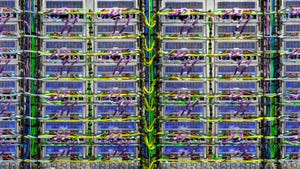SoftLayer Targets Lag as it Builds Gaming Business
Online gaming companies such as Broken Bulb Game Studios, East Side Games, KIXEYE, Hothead Games and Storm8 use SoftLayer's infrastructure offerings to provide a platform to develop, test, launch and run their latest games.
June 8, 2012


softlayer-racks-470
A look at the racks inside a SoftLayer Technologies data center in Dallas. (Photo: SoftLayer)
The eyes of the gaming world were focused on Los Angeles this week, where the E3 conference highlighted new games and technology. Among the companies on hand was SoftLayer, which showcased its work providing infrastructure to support gaming companies.
Online gaming companies such as Broken Bulb Game Studios, East Side Games, KIXEYE, Hothead Games and Storm8 use SoftLayer's infrastructure offerings to provide a platform to develop, test, launch and run their latest games. Unpredictable usage patterns place a premium on flexible infrastructure for these companies to prevent "lag" from network congestion and scalability problems.
"Working with SoftLayer gave us the right mix of dedicated and pure cloud-based resources," said Robert Nelson, CEO of Broken Bulb Studios. "We have a robust platform that can support our massive bursts in user adoption when rolling out new games. This is because we're able to easily provision any and all IT resources while overcoming network latency issues, giving our users a great online experience."
"We're typically working at odd hours, and it is difficult to have to wait for someone to get back to us for something as routine as turning up a server," John Todd, director of operations at KIXEYE, citing SoftLayer's easy-to-use, automated Web interface that allows KIXEYE to order and successfully turn up new physical servers on demand.
SoftLayer says it can provide gaming companies the ability to roll out cloud computing instances in minutes, or turn up dedicated servers in just two hours. SoftLayer supports gaming companies with dedicated, virtualized and managed servers available through a consumption-based billing model.
"Game developers do not have the time, operational expertise or resources to manage their own complex data centers because they need to focus on their core business -- developing new games, launching before the competition and keeping players engaged," said George Karidis, Chief Strategy Officer at SoftLayer. "Because we understand the high stakes of their operations, we've tailored our infrastructure-as-a-service offerings to meet gaming companies' changing demands -- from initial game release and explosive, overnight growth, to the variables that come with everyday play."
SoftLayer operates more than a dozen data centers around the world -- including Dallas; Seattle; San Jose; Washington, D.C.; Amsterdam and Singapore. The data centers are connected via private, 10 Gigabit Ethernet point-to-point connections for seamless, high-speed and high-performance integration.
Read more about:
EuropeAbout the Author
You May Also Like

.jpg?width=300&auto=webp&quality=80&disable=upscale)





